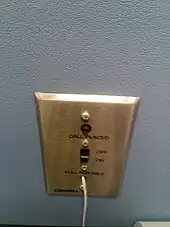
A bathroom emergency pullstring is a cord found in some bathrooms and restrooms that can be pulled in the event of an emergency suffered by the bathroom's user, such as a fall or lock-in. They are often found in the bathrooms of healthcare facilities, such as hospitals, nursing homes, assisted livings, and doctor's offices, in places frequented by senior citizens or disabled people, such as senior centers, places of worship, or in senior housing, and in other places where trouble may arise, such as the lavatories on aircraft or trains and in hotels.[1] These pull cords are part of a communication system where, when pulled, a light outside the bathroom flashes, which notifies a nurse or someone who is around to help the person in need. In addition to the flashing light, a buzzer or tone can be heard. Ideally, they are placed near the toilet or shower.[2]
For those living independently, the emergency cord is supplemental to other means for summoning help. Since not all falls will take place within reach of the cord, ideally, those using the bathroom should also have a method to call for help on their body.[3]
Some medical issues such as heart attacks are likely to occur while on the toilet for certain high-risk groups, because straining to produce a bowel movement can exacerbate these issues.[4] Bathroom activity is usually private and with a locked door, so the availability of a way to summon help can raise survival rates.
United States federal law requires that in facilities with emergency cords, the system must work properly.[5]
See also
References
- ↑ "There also is an emergency pull string in the bathroom and bedroom of the units should the residents find themselves in trouble." in Jordyn Dahl (July 13, 2011). "Want to live here? Get in line". The Durango Herald. Retrieved 12 February 2012.
- ↑ Krueger, Barbara; Stewart, Nika (2010-04-13). Knack Universal Design: A Step-by-Step Guide to Modifying Your Home for ... – Barbara Krueger, Nika Stewart, Mark Davidson – Google Books. ISBN 9780762763252. Retrieved 2012-02-17.
- ↑ Ahronheim, Judith C.; Huang, Zheng-Bo; Yen, Vincent; Davitt, Christina; Barile, David (7 July 2005). Case studies in geriatric medicine – Judith C. Ahronheim – Google Books. ISBN 9780521531757. Retrieved 2012-02-17.
- ↑ David Cline and Latha Stead, Abdominal Emergencies (2007), p.56-65
- ↑ Code of Federal Regulations, Title 7, Agriculture, Pt. 2000-End, Revised as ... – Google Books. March 2010. ISBN 9780160847677. Retrieved 2012-02-17.